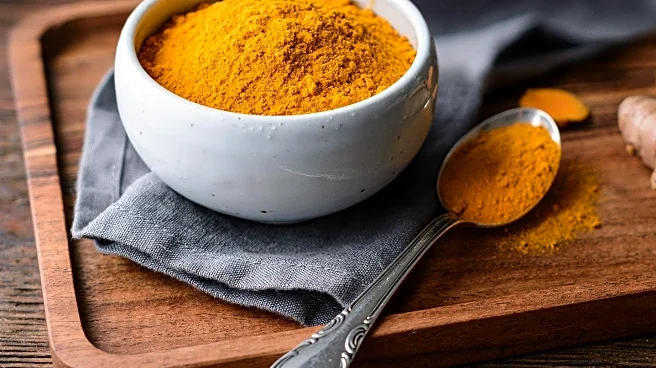What is the story about?
What's Happening?
Health experts have identified turmeric as a potent spice that may help reduce cancer risk. Turmeric contains curcumin, a compound known for its anti-inflammatory and antioxidant properties. These attributes contribute to reducing chronic inflammation and protecting cells from damage, which are factors that can lead to cancer. Additionally, curcumin supports gut health by promoting a healthy microbiome, which strengthens the gut lining, improves digestion, lowers inflammation, and supports immunity. This holistic approach makes the body more resilient against cancer. The American Cancer Society estimates that over 2 million people in the U.S. will be diagnosed with cancer this year, highlighting the importance of preventive measures like incorporating turmeric into one's diet.
Why It's Important?
The significance of turmeric in cancer prevention lies in its ability to address multiple health aspects simultaneously. By reducing chronic inflammation and protecting cells from free radical damage, turmeric helps mitigate conditions conducive to cancer development. Furthermore, its role in enhancing gut health underscores the interconnectedness of bodily systems in disease prevention. As cancer remains a leading health concern in the U.S., dietary interventions such as turmeric offer accessible and natural ways to potentially lower cancer risk. This approach aligns with broader public health strategies that emphasize lifestyle changes, including diet, exercise, and reduced alcohol and tobacco use, as effective means to combat cancer.
What's Next?
While current research on turmeric's cancer-preventive properties is promising, most studies have been conducted on animals or in vitro. Therefore, further research involving human subjects is necessary to confirm these findings. In the meantime, health experts recommend incorporating turmeric into daily meals, leveraging its versatility in both sweet and savory dishes. This includes adding turmeric to oatmeal, baked goods, eggs, curries, and lattes. As public awareness grows, it is likely that more individuals will adopt turmeric as part of their dietary regimen, potentially influencing broader dietary trends and public health recommendations.
Beyond the Headlines
The exploration of turmeric's benefits extends beyond cancer prevention, touching on ethical and cultural dimensions. As a spice with deep roots in traditional medicine, turmeric's integration into modern health practices reflects a blending of cultural knowledge with scientific research. This trend may encourage further investigation into other traditional remedies, fostering a more inclusive approach to health and wellness. Additionally, the emphasis on gut health highlights the evolving understanding of the microbiome's role in overall health, potentially leading to new dietary guidelines and health policies.
















